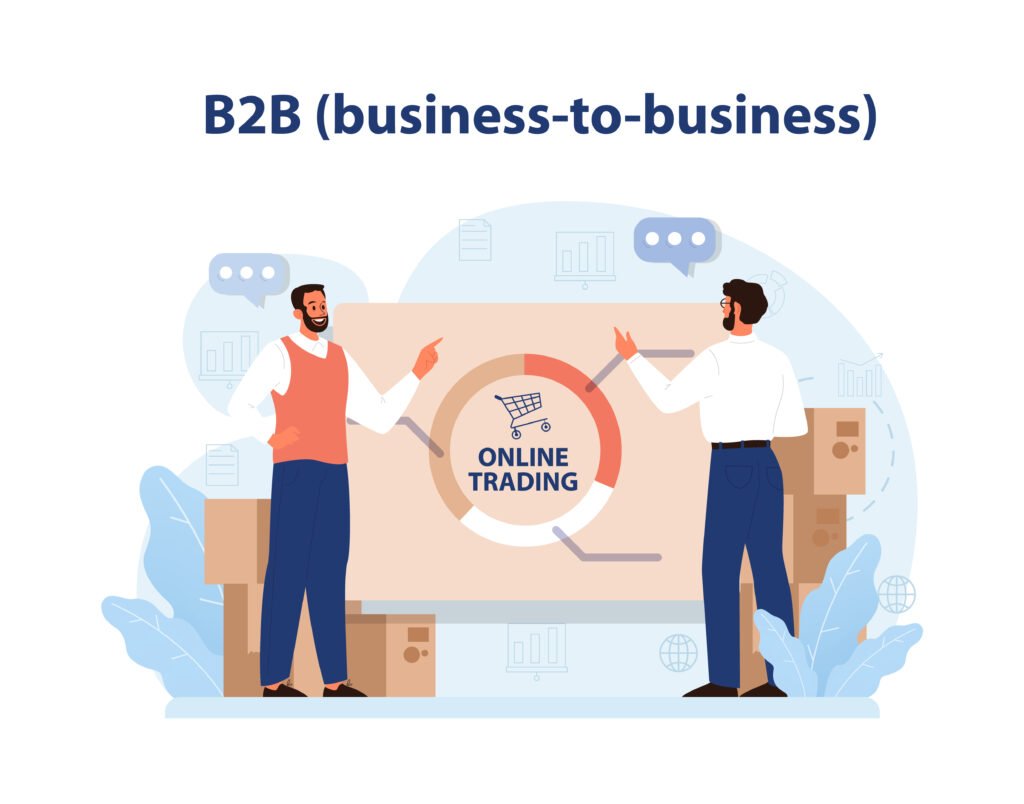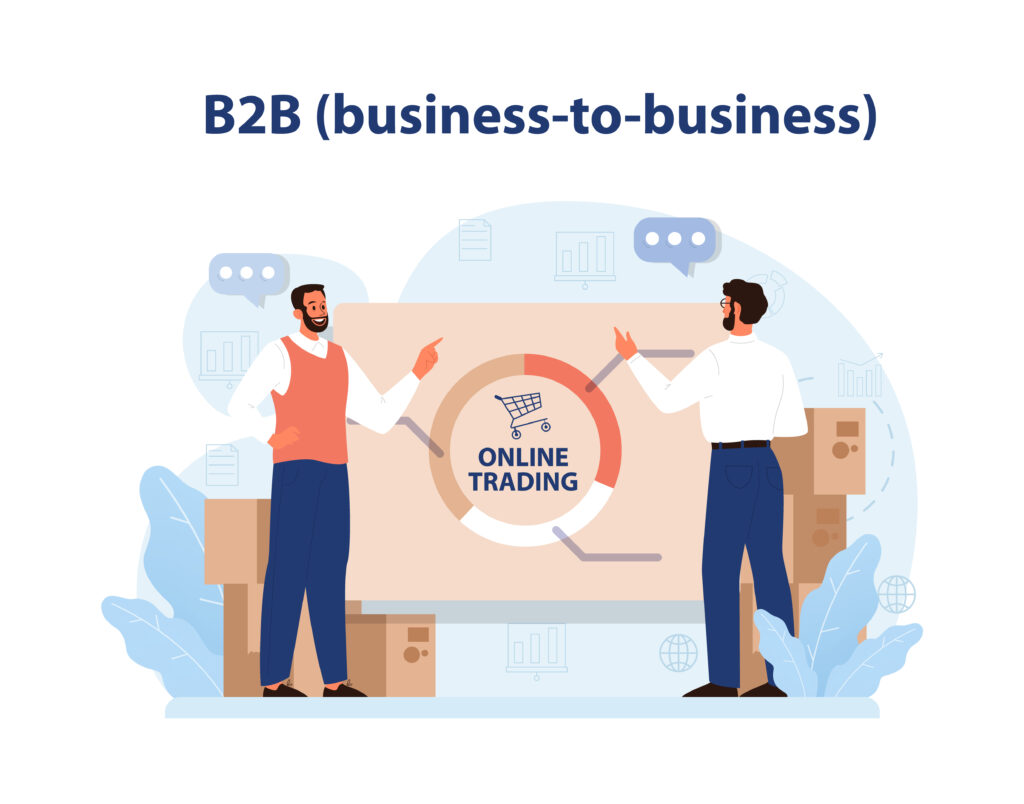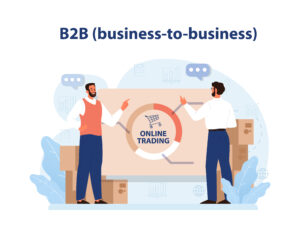B2B ecommerce platforms have become essential for businesses looking to streamline their operations and expand their reach. These powerful tools enable companies to conduct transactions, manage relationships, and grow their customer base in the online realm. As the B2B market continues to evolve, choosing the right ecommerce platform has a significant impact on a company’s success, influencing everything from sales processes to customer satisfaction.
Here, we help businesses navigate the complex world of B2B ecommerce solutions. This article covers key aspects such as platform architecture, customization options, and integration capabilities. You’ll gain insights into top B2B commerce platforms, learn about crucial factors to consider when selecting a solution, and discover ways to future-proof their investment. By the end, companies will be better equipped to make an informed decision that aligns with their unique business needs and goals.
The Evolution of B2B Ecommerce
Traditional B2B Sales vs. Ecommerce
The landscape of B2B sales has undergone a significant transformation in recent years. Traditional approaches, characterized by cold calls, lengthy RFP processes, and siloed interactions, are no longer effective in today’s market. Modern B2B buyers are more informed and independent, conducting extensive research online and comparing options before engaging with salespeople. This shift has necessitated a move towards value-driven engagement and trust-building, as buyers expect a seamless online experience with 24/7 accessibility to product information and self-service options .
Market Trends and Growth Projections
The B2B ecommerce market has experienced remarkable growth and is poised for further expansion. In 2023, the global B2B ecommerce market size was estimated at USD 18,665.95 billion and is projected to grow at a compound annual growth rate (CAGR) of 18.2% from 2024 to 2030 . This growth is driven by rapid technological improvements, including the incorporation of AI, machine learning, and data analytics, which enhance the functioning and capabilities of B2B platforms.
Impact of Digital Transformation on B2B Sales
Digital transformation has revolutionized B2B sales processes, enabling businesses to streamline operations and enhance customer experiences. The integration of enterprise systems such as Enterprise Resource Planning (ERP), automated order processing, and Customer Relationship Management (CRM) has improved connectivity among diverse business processes and ensured consistent information across enterprises. This digital shift has led to the adoption of hybrid sales models, combining in-person interactions, remote contact, and ecommerce self-service, with the potential to generate up to 50% more revenue compared to traditional models .
The future of B2B ecommerce is characterized by personalization, omnichannel experiences, and data-driven decision-making. AI-powered customization is elevating B2B ecommerce by adjusting product recommendations, pricing models, and marketing strategies based on individual consumer patterns . Additionally, the implementation of virtual and augmented reality technologies is creating new opportunities for interactive and immersive shopping experiences in the B2B sector .

Understanding B2B Ecommerce Platforms
B2B ecommerce platforms are transforming the way companies conduct business. These solutions enable businesses to increase sales, optimize efficiency, and reach new customers and markets. The global B2B ecommerce market was valued at USD 6.60 trillion in 2020 and is expected to grow by nearly 19% over the next eight years. This rapid growth is driven by robust technologies, a younger buying demographic, and the demand for a wide range of products .
Key Features of B2B Ecommerce Platforms
B2B ecommerce platforms offer several essential features:
- Robust search and navigation capabilities
- Personalized product recommendations
- Complex order management
- Flexible payment options
- Self-service corporate accounts
- User permissions and roles
- Content management and site-building tools
- Catalog management
- International support
These features are designed to streamline the B2B buying process and provide a seamless experience for both buyers and sellers.
Benefits of B2B Ecommerce for Businesses
Implementing a B2B ecommerce platform offers numerous advantages:
- Wider reach: Businesses can expand their customer base beyond geographical limitations .
- Increased efficiency: Automation of processes like inventory tracking and order management leads to streamlined operations .
- 24/7 availability: Online sales channels work continuously, even when sales teams are unavailable .
- Enhanced brand recognition: B2B ecommerce software allows for easy product promotion and increased sales .
- Improved customer relationships: Efficient order fulfillment and communication lead to better customer satisfaction .
Common Challenges in B2B Ecommerce
Despite its benefits, B2B ecommerce faces several challenges:
- Complex buying process: B2B transactions often involve multiple decision-makers and lengthy evaluation periods. Over 30% of B2B companies take between one and three months to close a deal.
- Cybersecurity threats: In 2022, the FBI received 2,385 ransomware complaints, resulting in over USD 34.30 million in losses.
- Integration difficulties: Combining existing systems with new ecommerce platforms can be challenging and requires careful planning.
- Inventory management: Maintaining accurate stock levels for a wide range of products can be complex, especially with bulk orders and multiple delivery locations.
Factors to Consider When Choosing a B2B ecommerce Platform
When selecting a B2B ecommerce platform, businesses must carefully evaluate several key factors to ensure they choose a solution that aligns with their specific needs and goals. These factors encompass a wide range of considerations, from user experience and mobile responsiveness to security and integration capabilities.
1) User Experience and Interface Design
A well-designed user interface is crucial for B2B ecommerce success. The platform should offer intuitive navigation, easy product discovery, and streamlined checkout processes. This enhances customer satisfaction and can lead to increased sales and repeat business.
2) Mobile Responsiveness and Omnichannel Capabilities
In today’s mobile-first world, B2B buyers expect seamless experiences across all devices. A responsive design that adapts to various screen sizes is essential. Additionally, omnichannel capabilities ensure consistent experiences across multiple touchpoints, including mobile apps, social media, and in-person interactions.
3) Security and Compliance Requirements
Given the sensitive nature of B2B transactions, robust security measures are paramount. The chosen platform should adhere to industry standards for data protection and offer features like SSL encryption, secure payment gateways, and regular security updates. Compliance with relevant regulations, such as GDPR or CCPA, is also crucial for businesses operating in multiple regions.
4) API-first Approach
An API-first approach allows for seamless integration with existing systems and third-party applications. This flexibility enables businesses to customize their ecommerce solution to fit their unique workflows and processes. Strong support for integrations with ERP systems, CRM tools, and other business software is essential for creating a cohesive ecosystem.
5) Open-source vs Proprietary Software
When it comes to software choice, open-source platforms offer flexibility that proprietary solutions may lack. Open-source code allows for easy modification and customization, making it suitable for businesses that need to adapt to various industries or regions. With open-source, businesses have greater control over their platform’s functionalities, enabling them to tailor the software to their exact requirements.
6) Scalability and Performance
As a business grows, its eCommerce platform must scale to handle increasing demands. A robust B2B platform should be capable of managing large inventories with potentially millions of SKUs, multiple pricing structures, and complex organizational hierarchies. The ability to support multi-brand, multi-location, and multi-currency setups is essential for companies expanding into new markets or regions.
7) Customizability to Business Needs
A B2B platform must offer the flexibility to be tailored to your business’s unique processes. Whether it’s modifying the storefront design, adjusting workflows, or integrating custom payment options, the platform should allow for easy customization. This adaptability can reduce development time and costs while enabling businesses to enhance their platform as needed, whether through A/B testing, adding new features, or fine-tuning existing functionalities.
B2B Ecommerce Platform Architecture
Headless Commerce vs. Traditional Platforms
B2B ecommerce platforms are evolving, with headless commerce emerging as a powerful alternative to traditional systems. Headless commerce separates the front-end presentation layer from the back-end ecommerce engine, allowing for greater flexibility and customization. This approach enables businesses to create content-led or experience-driven commerce by connecting specialized content management systems (CMS) or digital experience platforms (DXP) to the back end.
Cloud-Based vs. On-Premise Solutions
When considering ecommerce architecture, businesses must choose between cloud-based and on-premise solutions. Cloud-based infrastructure leverages third-party providers like Amazon Web Services (AWS) or Google Cloud, offering scalability, flexibility, and reliability. On-premise solutions, while providing full control and customization, are generally less flexible and scalable. Cloud-based systems offer lower total cost of ownership (TCO) and require less hardware and IT management.
Microservices and Modular Approaches
Microservices architecture is gaining traction in B2B ecommerce, with 85% of enterprise businesses and 75-84% of mid-sized businesses adopting this approach. This modular design allows for independent operation of services, enabling faster development, easier scaling, and reduced downtime. Microservices support headless operations by providing ultimate flexibility in customization and scalability, allowing businesses to use only the necessary products, services, and capabilities.
Customization and Flexibility in B2B Ecommerce
Tailoring the Platform to Your Industry
B2B ecommerce platforms offer extensive customization options to meet the unique needs of different industries. These solutions provide features such as customizable product catalogs, real-time inventory management, and advanced search capabilities. For instance, WebAlliance, a tailored ecommerce solution, allows distributors to showcase their vast array of products in a structured and easy-to-navigate manner. This level of customization enables businesses to create personalized user experiences, using customer data to deliver relevant product suggestions and promotions .
API Integrations and Extensibility
API integrations play a crucial role in B2B ecommerce, allowing for seamless connectivity between systems. These integrations streamline operations, enhance communication, and improve data exchange between business partners. When companies leverage APIs, they can achieve higher operational efficiency and build stronger relationships with partners. For example, integrating an e-commerce platform with a shipping provider’s API can automate order fulfillment processes, making operations more efficient .
Personalization Options for B2B Buyers
Personalization in B2B ecommerce goes beyond individual contract terms, encompassing specialized offers for various clients within the same industry. It involves creating individualized experiences based on buyers’ behavior, roles, and interests. Some key personalization options include:
- Personalized catalogs with agreed prices and discounts
- Customized order processing and delivery
- Role-based processes and credit limits
- Tailored purchase history and recommendations
Top B2B Ecommerce Platforms Comparison
When selecting a B2B ecommerce platform, businesses must consider various factors to ensure they choose a solution that aligns with their specific needs and goals. This comparison will explore key aspects of open-source and SaaS solutions, pricing models, total cost of ownership, and scalability.
Open-Source vs. SaaS Solutions
Open-source platforms provide full access to the source code, allowing for extensive customization. In contrast, SaaS (Software-as-a-Service) solutions offer subscription-based models with built-in features and maintenance. While open-source options may seem cost-effective initially, they often require significant investment in development, hosting, and security.
Pricing Models and Total Cost of Ownership
The total cost of ownership (TCO) for ecommerce platforms extends beyond initial expenses. SaaS solutions typically include hosting, security, and maintenance in their subscription fees, while open-source platforms may have hidden costs. For example, Shopify Plus charges an annual fee of USD 24,000 for customers with less than USD 9.60 million in sales each year .
Scalability and Performance
Scalability is crucial for B2B ecommerce success. A scalable platform should handle increased traffic, orders, and growth demands. SaaS solutions often provide better scalability options, with features like load balancing and automatic updates. Open-source platforms may require additional investments in infrastructure to achieve similar performance levels.
Selecting the Right B2B Ecommerce Platform
Choosing the right B2B ecommerce platform is crucial for business success. A systematic evaluation process is essential to align the platform with specific business objectives and technological requirements. This process involves several key steps, starting with a clear definition of business goals and a thorough needs assessment.
Assessing Your Business Needs
Organizations must conduct a comprehensive needs assessment to identify their specific requirements. This includes evaluating the current platform’s limitations, existing tech stack, operational workflows, and customer experience needs. It’s important to consider factors such as scalability, customization capabilities, and integration requirements.
Evaluating Platform Capabilities
When evaluating platform capabilities, businesses should focus on features that cater to B2B-specific needs. These include account management functionalities, customizable pricing options, and product catalog management. Advanced search capabilities, mobile optimization, and customer support features are equally critical for seamless buyer journeys.
Integration with Existing Systems
Integration capabilities are important when selecting a B2B ecommerce platform. The chosen solution should seamlessly integrate with existing systems, including ERP, CRM, and other essential business applications. This integration enables real-time data synchronization, streamlined operations, and enhanced customer experiences. 80% of B2B organizations are actively seeking ways to integrate their B2B eCommerce technology with cloud-based ERP systems to move away from siloed operations.
Streamlining B2B Sales Processes
Automated Quoting and Negotiation Tools
B2B sales processes are becoming increasingly efficient through the implementation of automated quoting and negotiation tools. Configure, Price, Quote (CPQ) software streamlines complex sales processes by automating configurations, pricing, and quoting based on predefined rules . This automation eliminates manual errors and saves sales representatives valuable time, resulting in faster quote generation and improved sales efficiency. Automated quote management systems offer significant advantages, including higher conversion rates and a streamlined ecommerce shopping experience .
Self-Service Portals for B2B Customers
Self-service portals are revolutionizing B2B customer interactions. These platforms allow business users to access information, submit support tickets, and manage their accounts independently. According to McKinsey, 86% of B2B executives prefer self-service solutions for reordering rather than speaking with a salesperson . Self-service portals empower customers to explore product configurations, receive instant quotes, and access personalized pricing information, ultimately leading to a more satisfying buying experience.
Workflow Automation and Approval Processes
Implementing well-structured sales approval workflows is crucial for efficiency and accuracy in B2B sales. Automated approval workflows streamline processes, reducing delays and allowing sales teams to focus on closing deals. These workflows can include various stages, such as discount approvals, contract sign-offs, and invoice approvals. By leveraging technology solutions, organizations can optimize their sales approval workflows, ensuring transparency, accountability, and faster decision-making processes .
Future-Proofing Your B2B Ecommerce Investment
Emerging Technologies in B2B Ecommerce
The B2B ecommerce landscape is evolving rapidly, driven by technological advancements. Artificial Intelligence (AI) and Machine Learning (ML) are revolutionizing sales forecasting and customer behavior analysis. For instance, Procter & Gamble improved its sales forecast accuracy by 30% using predictive analytics. Blockchain technology is enhancing supply chain management, reducing complexity and minimizing fraud in cross-border transactions. Augmented Reality (AR) and Virtual Reality (VR) are transforming product presentations, with AR applications in industrial catalogs reducing order mistakes by 20-35%.
Scalability and Growth Considerations
Scalability is crucial for long-term success in B2B ecommerce. A scalable platform should handle increased traffic, support business expansion, and adapt to new selling models without compromising performance. According to Grand View Research, the B2B ecommerce market is projected to grow at a 19.7% CAGR through 2030. To capitalize on this growth, businesses must invest in cloud-based solutions with AI tools that offer predictive data models and enhance supply chain visibility .
Adapting to Changing Customer Expectations
B2B customers increasingly demand fast, convenient, and personalized service across all channels. Data shows that 57% to 70% of B2B customers complete their research before contacting a sales representative. To meet these expectations, businesses should embrace digital technologies, invest in data analytics for customer insights, and prioritize omnichannel experiences. Implementing ERP systems can streamline order management, provide real-time inventory visibility, and facilitate personalized pricing strategies .
Key Factors when Choosing a B2B eCommerce Platform
In summary, here are the key considerations when choosing the ideal B2B ecommerce platform for your business needs:
- User Experience and Interface Design
- Mobile Responsiveness and Omnichannel Capabilities
- Security and Compliance Requirements
- Modularity and Extensibility
- API-first Approach and Integrations
- Headless Architecture
- Localization and Multi-regional Support
- Personalization and Customization
- Cloud-native Approach
- Open-source Flexibility
Conclusion
As we’ve explored, the B2B ecommerce landscape is changing fast, with new tech and customer expectations shaping its future. Choosing the right platform has a big impact on a company’s success, affecting everything from sales to customer satisfaction. It’s crucial to pick a solution that fits your specific needs, can grow with your business, and adapts to new trends.
In the end, success in B2B ecommerce comes down to understanding your market, leveraging the right tools, and always putting your customers first. To see how ecommerce excellence can transform your B2B business, book a demo today and take the first step towards a more efficient and profitable future.
FAQs
What are some top B2B ecommerce platforms for business professionals?
Several B2B ecommerce platforms are highly recommended for business professionals, including WooCommerce, Shopify, nopCommerce, TotalOne, Adobe Commerce (formerly Magento), and Virto Commerce. Shopify and WooCommerce are particularly suitable for small to medium-sized businesses that prioritize innovation, while Adobe Commerce and Virto Commerce are excellent for enterprises requiring advanced features.
What exactly is a B2B ecommerce solution?
B2B ecommerce, or business-to-business electronic commerce, involves the online sale of goods or services between businesses. This type of commerce is distinct from B2C (business-to-consumer) ecommerce, where businesses sell directly to individual consumers.
How should I go about selecting a B2B ecommerce platform?
When choosing a B2B ecommerce platform, it’s crucial to select one that seamlessly integrates with your existing systems, such as enterprise resource planning (ERP), customer relationship management (CRM), and inventory management systems. Platforms like Shopify are known for their robust API capabilities and extensive range of integrations that facilitate easy plug-and-play setup.
Which platforms are considered the best for running an ecommerce business in 2024?
The top ecommerce platforms for 2024 include Shopify, Adobe Commerce, WooCommerce, Squarespace, TotalOne, Square Online, Volusion, and OpenCart. Volusion is one of the longest-standing platforms, having been established in 1999, while OpenCart offers a free, open-source solution that is straightforward to configure.



